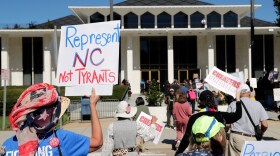Not much has changed since the North Carolina Supreme Court last year upheld a trial court ruling that struck down a mostly GOP-backed law requiring voters to present photo ID at the polls. The law was found to target Black voters, not with overt racial animus, but with the intentional disparate impact of entrenching Republican power, much like a previously discarded Republican-sponsored ID bill.
Since that December ruling, state lawmakers have not redrafted an ID law and they haven't conducted any studies to determine how to craft a statute that would minimize any discriminatory impact. But, in the November midterms, Republicans swept statewide judicial races and won a 5-2 majority on the state's high court.
And when GOP lawmakers asked the newly constituted conservative court to rehear the ID case as well as a landmark redistricting case that also went against them, their wish was granted.
Attorney Pete Patterson representing the Republican legislative defendants asking the new court to overrule last year's majority decision said the case comes down to inferences about what the GOP-controlled North Carolina General Assembly intended as it pushed through the ID law.
"And time after time," Patterson argued in Thursday's rehearing, "the trial court drew bad-faith inferences when good-faith inferences were just as available, if not more available."
Patterson and his clients noted that the challenged law expanded the number of permissible IDs voters could use and provided recourse for voters who show up at the polls without the requisite ID. He further argued that the previous court should have afforded lawmakers a presumption of good faith and not placed the burden on them to show a lack of discriminatory intent.
'Where do we draw the line?' a justice asks
But Justice Anita Earls, one of two Democrats remaining on the high court noted these arguments were made, and considered, on appeal last year.
"So, help me understand when any case would be final," Justice Earls said to Patterson. "Because in every case there are two sides to the argument and the side that loses believes that we misapprehended the law and got it wrong, so where do we draw the line?"
Patterson replied, "When a majority of this court, considering the arguments that something that was misapprehended or overlooked, decides that 'No, we do not agree with that.'"
Attorney for Republican lawmakers says last year's court ruling was 'hasty'
One of Patterson's key arguments is the haste with which last year's court heard and considered the appeal of the trial court's ID ruling. He noted that the high court granted a request by the parties challenging the law to skip a hearing before the GOP-majority Court of Appeals and go straight to expedited oral arguments before the then-Democratic majority state Supreme Court.
But haste is one of the factors that weighed against GOP lawmakers in the case against the ID law. In 2018, voters approved a referendum calling for an amendment to the North Carolina Constitution requiring photo ID at the polls. In those midterms, Republicans also lost their veto-proof majority at the legislature.
But rather than wait for a new, more politically balanced General Assembly to consider enabling legislation for the photo ID requirement, the legislature's Republican majority pushed the challenged statute through a lame duck, post-election session while they still had the numbers to override a veto by Gov. Roy Cooper, a Democrat.
Attorney Paul Brachman, representing the parties who successfully challenged the ID law, argued a trial court's finding is not wrong just because a different conclusion can be drawn from the facts.
"That's all that the appellants are asking this court to do is draw their preferred inference from the facts," he concluded.
Brachman faced intense questioning from Justice Phil Berger Jr., one of the court's five Republican justices and the son of Phil Berger, Sr., the president pro tempore of the North Carolina Senate.
"I'm asking you at what point could this identical legislation be passed by a future legislature," Berger Jr. pressed Brachman.
A landmark redistricting case also got a rehearing this week
The state Supreme Court heard arguments this week in a redistricting case that Democrats and voting rights advocates also thought was settled last year. In 2022, again, when Democrats held a narrow majority on the seven-member court, they ruled that political maps drawn by the Republican-controlled North Carolina General Assembly were unconstitutionally gerrymandered for extreme partisan advantage — and ordered new maps for state legislative and U.S. House districts.
Republicans assailed that ruling and sought a rehearing before the high court's newly constituted GOP majority.
Their attorney, Phil Strach, argued last year's ruling and remedial maps should be overturned because the state constitution provides no standard or tools for measuring partisan gerrymandering.
"Just because it's not fair doesn't mean that this body, or any body, any political body, has the authority to deal with that question," Strach argued before the court.
Opposing attorneys argued North Carolina's Constitution provides for free and fair elections, and that statistical evidence in last year's case shows Republicans violated that principle.
Attorney Lali Madduri of the Elias Law Group, representing the parties who challenged those maps, argued at Tuesday's redistricting hearing that the state constitution doesn't guarantee proportionality but does require equal voting power for voters.
"That means the opportunity to translate their votes into seats," she said.






